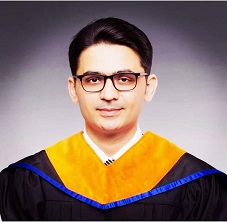
Dr REHMAT Ullah
Assistant Professor at Cardiff Metropolitan University, UK
Dr. Rehmat Ullah earned his Ph.D. degree in electronics and computer engineering from Hongik University, South Korea. He currently works as an Assistant Professor at the school of technologies, Cardiff Metropolitan University, UK. Previously, he worked as a Research Fellow (Post-Doctorate) at the University of St Andrews, UK, and Queen’s University Belfast, UK, and as an Assistant Professor at Gachon University, South Korea.
Dr. Rehmat has been a member of the technical program committees of several flagship conferences such as ACM ICN, ACM IMC, ACM MobiHoc, IEEE VTC, IEEE ICC, and he is an invited reviewer for numerous high-impact journals such as IEEE/ELSEVIER/ACM/WILEY. His work has appeared in more than 45 research papers in peer reviewed conferences and top journals such as IEEE Communications Magazine, IEEE Internet of Things journal, IEEE Transactions on Network Science and Engineering, IEEE Wireless Communications Magazine, Journal of Network and Computer Applications, and Future Generation Computer Systems. He currently holds four patents, and two US patents are under review. His research focuses on the broader areas of network and distributed systems particularly the development of architectures, algorithms, and protocols for emerging paradigms, such as edge computing, Internet of Things, information centric networking, and 5G evolution and beyond with a recent focus on federated learning for edge computing systems. This includes the design, measurement studies, prototyping, testbed development, and performance evaluations. More information is available from https://rehmatkhan.com/
Standard machine learning (ML) techniques require centralising the training data on cloud data centers due to the high computing resources (e.g., GPUs) available on the cloud, so that large amounts of data can be analyzed to obtain useful information for the detection, classification, and prediction of future events with high accuracy. However, the proliferation of mobile devices, ranging from smartphones to autonomous vehicles, drones, and various Internet-of-things (IoT) devices such as wearable sensors and surveillance cameras, has resulted in a vast amount of data being generated. Data from all of these devices is collected in a distributed manner and sent to a central server, where it is used to train a powerful ML model. Due to network bandwidth, latency and data privacy concerns, sending all of the data to a remote cloud is impractical and often unnecessary.
Furthermore, in many applications, user data contains sensitive personal information, raising privacy concerns as another reason to avoid offloading data to a centralized server. Instead of sending raw data to distant clouds, it should be processed and stored locally leveraging edge computing paradigm. Furthermore, the industry giants are also shifting from a traditional cloud-based model to edge computing platforms due to major factors of latency, bandwidth, and data privacy. In this regard, Google recently introduced the concept of Federated Learning (FL) in 2016, which is a privacy-preserving ML technique in which an ML model is collaboratively learned across several distributed devices (e.g., mobile phones), while all training data is kept on local devices.
The FL provides privacy-by-design and is well suited for edge computing applications because it can take advantage of the computation power of edge servers. In this talk, I will discuss distributed ML, with a focus on FL for edge computing systems. I will start by giving a quick explanation of Cloud Computing, Edge computing, FL, how FL solves the data island problem in IoT and state-of-art advances of FL. The edge federated learning applications with open-source platforms, current trends, and recent development will be discussed particularly form the network perspective. Furthermore, open research challenges with potential solutions will be presented.